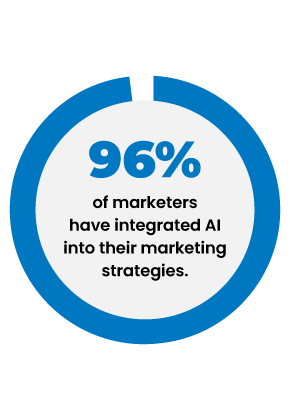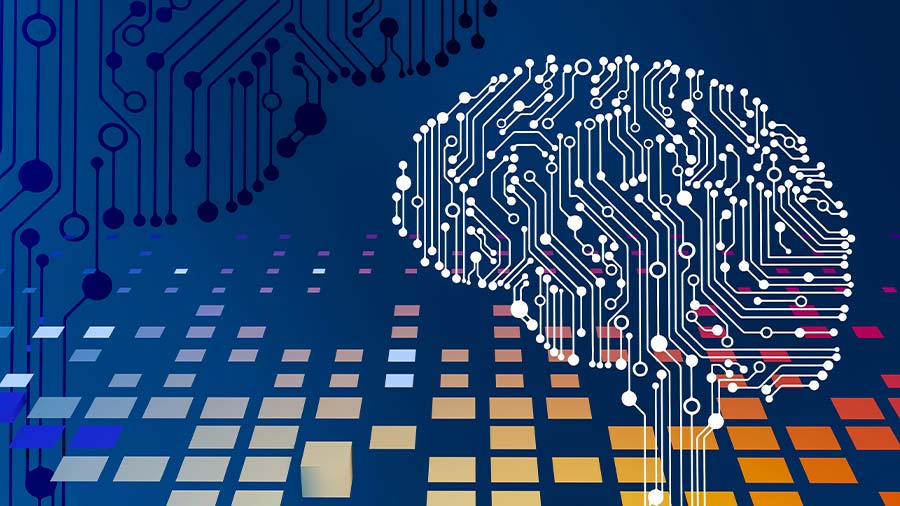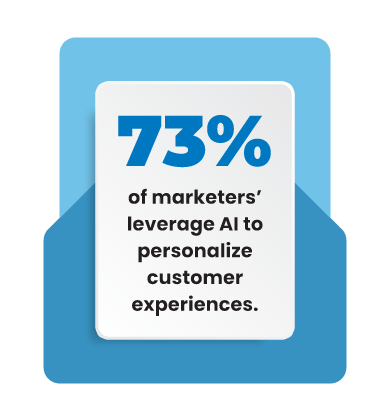B2B marketing has always been a challenging endeavor, marked by longer sales cycles, complex buying groups, and the constant need to prove ROI. This inherent complexity is precisely what makes Artificial Intelligence (AI) a truly transformative strategic lever.
The B2B marketing landscape is undergoing a profound and rapid transformation, driven primarily by AI’s integration. This article explores how AI is not just optimizing existing tasks but fundamentally reshaping B2B practices, from lead generation and content personalization to sophisticated predictive analytics. Let’s delve into the practical applications and strategic implications of leveraging AI to achieve unprecedented efficiency and conversion rates in this competitive space.
Artificial Intelligence Definition: What AI Means for B2B Marketing
AI in B2B marketing refers to the use of technologies such as machine learning, natural language processing, and predictive analytics to create marketing strategies that are more data-driven, personalized, and efficient. It enables businesses to automate repetitive tasks, uncover deeper customer insights, and enhance decision-making at every stage of the buyer journey. Imagine having an intelligent assistant that can predict which leads are most likely to convert, craft and optimize content syndication automatically, and analyze vast amounts of data in minutes rather than weeks.
Artificial intelligence technology also helps tailor messaging for different buyer personas, ensuring every communication feels timely and relevant. Beyond automation, it empowers marketers to focus on creativity, strategy, and innovation by handling the heavy lifting of analysis and execution.
From lead scoring and account-based targeting to content personalization and campaign optimization, artificial intelligence technology is reshaping how B2B organizations attract, engage, and retain customers. Generative AI further transforms marketing from a manual, intuition-based process into an intelligent, scalable growth engine that connects every activity to measurable outcomes.
 Benefits of AI in Marketing:
Benefits of AI in Marketing:
The role of artificial intelligence in marketing has become a transformative force, reshaping how businesses attract, engage, and convert their audiences. Here are the benefits of AI in marketing.
Dynamic and Predictive Content Strategy
Artificial intelligence in business is revolutionizing content creation by enabling dynamic, adaptive assets that evolve in real-time based on the reader’s profile. It functions as a strategic partner by using prediction technology to develop content maps and personalized reports that anticipate customer requirements before they become evident, establishing deeper connections and positioning the brand proactively.
Seamless Buyer Journey and Obstacle Elimination
Artificial intelligence in business transforms the complex B2B buying process by delivering ease, speed, and personalization. It uses automated chatbots and personalized recommendation systems to create an unobstructed, intuitive path to purchase. This process acceleration builds buyer confidence, reduces feelings of being overwhelmed, and ensures the brands that make buying effortless are the ones that win.
Proactive and Targeted Engagement
The artificial intelligence technology uses behavioral patterns and intent signals to locate and engage high-intent prospects precisely. Predictive analysis allows sales teams to identify upcoming client needs before they are made explicit, enabling outreach that offers immediate solutions instead of generic pitches. This makes messaging highly relevant and significantly enhances overall effectiveness.
Advanced Lead Qualification and Sales Focus
Artificial intelligence technology takes lead qualification beyond traditional scoring by analyzing prospect buying signals and forecasting future needs to determine the ideal outreach timing. By automating time-consuming tasks such as data assessment, AI frees sales professionals to focus on building stronger client relationships and strategic planning, ultimately making them more consultative and productive.
How Can AI-Powered Personalization Transform Marketing and Sales?
In today’s B2B landscape, personalization has evolved from a competitive advantage to a fundamental expectation. Modern buyers seek the same tailored and intuitive experiences they receive as consumers, and AI makes this possible at scale. By analyzing diverse data sources such as past interactions, browsing behavior, firmographics, and purchase history, AI enables marketers to deliver hyper-personalized content, offers, and experiences at every stage of the buyer journey.
AI-driven tools can segment audiences into precise micro-groups or even individual accounts and automatically generate tailored recommendations. For example, AI can study a prospect’s online behavior to suggest relevant case studies or product demos, while intelligent email platforms dynamically adjust subject lines and content to match each recipient’s preferences or intent. In Account-Based Marketing (ABM), AI detects real-time intent signals and ensures the right message reaches the right decision-maker at the ideal moment.
The results of such personalization are profound. Businesses experience higher engagement as prospects receive content that resonates with their challenges and goals. Conversion rates increase because buyers are presented with solutions that align with their pain points, rather than generic pitches. AI-powered personalization enhances customer satisfaction and loyalty by ensuring every touchpoint, from emails and chatbots to sales calls, feels helpful and relevant. This approach not only humanizes digital interactions but also optimizes marketing spend, as efforts are concentrated where they have the greatest impact. AI-powered personalization transforms B2B marketing and sales by combining intelligence, automation, and empathy, creating experiences that feel uniquely crafted for every customer and driving stronger relationships and measurable business growth.
How to Use AI in Marketing: Key Applications
By converting vast datasets into actionable insights and enabling automation and personalization, AI has become central to B2B marketing strategy. Here are the six key applications:
Predictive Lead Scoring
AI-powered lead scoring enables marketers to identify high-intent prospects using behavioral, firmographic, and intent data. It tracks engagement patterns such as website visits, downloads, or email interactions. This helps sales teams focus on qualified prospects while reducing manual evaluation. Over time, the AI model improves accuracy, ensuring more efficient lead prioritization and stronger conversion rates in B2B sales pipelines.
Personalized Content and Email Marketing
AI in marketing allows marketers to deliver tailored content generation at scale by analyzing user behavior, preferences, and engagement history. It predicts what each audience segment wants to read and the best time to send it. Instead of one-size-fits-all messaging, AI tools dynamically adjust tone, content type, and visuals. The result is higher engagement, improved open rates, and stronger relationships through hyper-personalized email campaigns and content journeys.
Dynamic Pricing and Offer Optimization
AI continuously monitors market conditions, competitor activity, and customer demand to set optimal prices in real time. It detects patterns, such as buying cycles, deal size, or seasonal demand. For B2B marketers, this ensures competitiveness while maximizing margins. Whether offering volume discounts or custom enterprise rates, AI-driven pricing aligns value with demand generation, boosting profitability and customer satisfaction simultaneously.
Ad Targeting and Campaign Optimization
AI transforms advertising efficiency by identifying the right audience segments and optimizing bids automatically. It learns which ad creatives, formats, and platforms perform best, reallocating spend to maximize ROI. With AI, B2B brands can target decision-makers based on intent signals, firmographics, and behavioral data. This ensures every ad impression contributes to brand visibility and lead generation while eliminating wasteful ad spend through precision targeting.
Sentiment Analysis and Customer Insights
AI-driven sentiment analysis processes reviews, social mentions, and feedback to gauge how customers perceive your brand, products, or campaigns. It categorizes opinions as positive, negative, or neutral, helping teams detect emerging issues and opportunities early. This insight enables proactive marketing strategies, adjusting tone, messaging, or offerings before dissatisfaction escalates. By understanding audience emotions, B2B marketers build stronger trust and improve brand reputation across digital channels.
Predictive Analytics for Demand Generation
Predictive analytics uses AI to forecast customer behavior and market trends by analyzing past and real-time data. It identifies which leads are most likely to convert, predicts churn, and reveals hidden growth opportunities. For B2B marketers, this means smarter resource allocation and more effective campaign planning. With predictive insights, companies move from reactive marketing to proactive, data-driven strategies that boost revenue and long-term client retention.

How to Incorporate AI into Your Marketing Strategy?
AI is transforming modern marketing by automating decision-making, uncovering patterns in data, and improving campaign precision. The following are the steps of incorporating AI into your marketing strategy:
Stage 1: Define Clear Objectives
Start by identifying what problems AI in digital marketing should solve for your business. Are you aiming to improve lead generation, personalize outreach, or optimize ad targeting? Define specific, measurable goals such as “increase lead quality by 25%” or “reduce customer response time by 40%.” Clear objectives ensure your AI for marketing campaigns align with business outcomes and make it easier to track ROI and success over time.
Stage 2: Audit and Prepare Your Data
Conduct a complete audit of your CRM, campaign results, and customer interactions to identify gaps or inconsistencies. Clean, structured, and unified data allows AI models to generate accurate insights that strengthen AI in digital marketing performance. Use data-cleaning tools to remove duplicates, fix missing entries, and standardize formats. A well-organized data foundation ensures reliable predictions, sharper targeting, and improved personalization for AI for sales and marketing initiatives.
Stage 3: Choose the Right AI Tools
Select AI for marketing campaigns that best fit your goals and technology stack. Whether it’s predictive lead scoring, content personalization, or campaign optimization, focus on tools that address your biggest pain points. Evaluate integration compatibility, user-friendliness, and scalability. Always test new platforms before committing; trial periods can reveal whether the tool delivers measurable value in your unique business context.
Stage 4: Start Small with Pilot Projects
Begin with a low-risk, high-impact pilot project like AI-driven email personalization or predictive analytics for one market segment. Set clear KPIs such as engagement rates or conversion improvements to evaluate success. Keep the pilot scope manageable to refine your approach before expanding. Early, focused wins build internal confidence and help demonstrate the practical benefits of AI in marketing to stakeholders.
Stage 5: Train and Empower Your Team
AI adoption succeeds when people understand how to use it effectively. Offer both technical and strategic training tailored to different roles such as data specialists, marketers, and content teams. Encourage experimentation and collaboration so teams can use AI in digital marketing to develop creative strategies and smarter campaigns. Empowered employees are more confident in leveraging data insights for continuous growth.
Stage 6: Integrate, Monitor, and Optimize
Once proven, integrate AI tools into your main workflows and connect them with CRM, analytics, and email platforms. Automate simple processes like segmentation or ad targeting first, then scale. Regularly monitor results, track KPIs, and retrain AI models based on new data. Continuous optimization ensures sustained performance and relevance as market conditions evolve.
Artificial Intelligence in Marketing: Common Pitfalls and Practical Solutions
The first major issue is data privacy and security. Since AI relies heavily on customer data, mishandling sensitive information can lead to breaches of trust and violations of privacy regulations, such as GDPR and CCPA. To address this, marketers should encrypt data during transmission and storage, anonymize personal identifiers, and conduct regular security audits to ensure compliance and protect customer information.
A second challenge lies in data quality and bias. AI systems can only perform as well as the data they’re trained on. Inaccurate or biased data can result in flawed insights and discriminatory targeting. Maintaining clean, updated, and diverse datasets while auditing AI outputs regularly helps reduce these risks and improve campaign effectiveness.
Another obstacle is the skills gap and lack of in-house expertise. Many marketing teams lack the technical knowledge needed to operate AI tools effectively, leading to underused technology and missed opportunities. Investing in continuous training, collaborating with AI experts, and using user-friendly platforms with strong support can help bridge this gap. High implementation costs also pose a significant challenge, especially for smaller organizations. AI platforms often require large upfront investments in software, data infrastructure, and skilled staff. To overcome this, businesses should start small with scalable tools, explore flexible subscription-based pricing, and run pilot projects to measure ROI before full deployment.
Over-reliance on AI risks making marketing communications feel impersonal and mechanical. Marketers should use AI to handle data-driven tasks while keeping humans at the forefront of storytelling, empathy, and customer relationships. The key lies in balancing AI in marketing automation with authenticity, allowing AI to enhance, not replace, the human touch in marketing.
 Best Practices for Implementing AI in B2B Marketing
Best Practices for Implementing AI in B2B Marketing
The application of artificial intelligence in marketing does not need to overhaul your entire strategy or require investing in multiple tools to see results. The key is to start small, focus on impact, and refine continuously. Begin by auditing your marketing workflow to identify repetitive, manual, or data-intensive tasks that consume time or hinder performance. Pinpoint where inefficiencies occur, such as lead scoring, campaign optimization, or content production—and explore where AI can automate or enhance these processes.
Next, choose the right AI tools to solve specific business challenges rather than chase trends. For B2B marketers, valuable categories of AI for sales and marketing include predictive analytics for lead scoring, AI-driven email and chat automation for personalized engagement, SEO optimization platforms for performance tracking, and AI writing tools for scalable content creation. Start with one or two tools that address your most pressing needs and integrate them seamlessly into your existing workflows.
Launch small-scale experiments to evaluate effectiveness before full deployment. Compare results, monitor key metrics, and refine your strategy based on insights. AI systems improve over time, so consistent testing and optimization are essential for long-term success. While AI enhances efficiency, it cannot replicate human creativity, empathy, or strategic judgment. Use AI to handle data-driven tasks, but rely on marketers to craft authentic narratives, nurture relationships, and shape brand storytelling. The most successful B2B marketers will strike the right balance, leveraging AI for intelligence and automation while keeping human creativity at the core of every campaign.
Future Trends of AI in Marketing
As artificial intelligence technology continues to evolve, several AI-driven trends are reshaping how marketers engage prospects, optimize campaigns, and accelerate revenue growth. Some of the emerging trends shaping the future of AI in marketing are as follows:
Generative AI in marketing for Content Creation
Generative AI tools like ChatGPT, Jasper, and Copy.ai are revolutionizing B2B content production. These platforms create blogs, ads, and emails tailored to audience segments while maintaining brand consistency. They also repurpose long-form assets into shorter formats like social posts, helping marketers scale creativity, boost engagement, and save significant production time.
Predictive Lead Scoring
Another powerful application of artificial intelligence in marketing is predictive lead scoring. AI-powered models use behavioral, CRM, and firmographic data to identify and prioritize high-intent prospects, ensuring that marketing and sales teams focus on accounts most likely to convert. Over time, these systems self-learn and enhance accuracy, aligning marketing efforts with sales outcomes and accelerating the entire B2B buyer journey.
AI-Powered Conversation Intelligence
Platforms like Gong and Chorus analyze recorded sales interactions using NLP to extract insights on customer needs, objections, and sentiment. These tools help teams refine messaging, improve sales scripts, and personalize follow-ups. By revealing what drives successful deals, conversation intelligence enables data-driven coaching and strengthens alignment between customer feedback and marketing strategy.
Visual & Voice Search Optimization
AI-driven visual and voice search is redefining B2B discoverability. With voice assistants like Alexa and visual search tools, marketers must optimize content for conversational and image-based queries. This trend empowers B2B brands to engage buyers through multiple input formats, improving visibility and accessibility across manufacturing, logistics, and technology-driven industries.
AI-Driven Competitor Intelligence
AI tools such as Crayon and Kompyte automate competitive monitoring, tracking pricing, content updates, and strategic moves. By turning vast data into actionable insights, marketers can quickly adapt campaigns, reposition offerings, and identify emerging threats or opportunities. AI in marketing automation enhances agility and gives brands a measurable strategic advantage in competitive B2B markets.

Success Stories: AI in Marketing
AI is revolutionizing B2B marketing by enabling organizations to make data-driven decisions, enhance customer experiences, and streamline operations. Here are the AI in marketing examples:
- IBM’s Watson AI empowers B2B marketers with data-driven decision-making. It analyzes customer sentiment, automates content personalization, and enhances lead scoring accuracy. Watson’s natural language capabilities also help brands understand audience intent, enabling more relevant engagement. IBM’s Project Debater further demonstrates how AI can analyze complex topics and generate persuasive arguments for marketing communication.
- Amazon applies AI through predictive analytics to anticipate customer needs. Its recommendation systems and cloud-based AI services via AWS help B2B businesses enhance targeting, demand forecasting, and product recommendations. Amazon Go showcases real-world automation powered by AI, illustrating how predictive modeling can simplify user experiences and drive intelligent business operations.
- Thomson Reuters integrates AI to streamline data-driven services for legal, tax, and accounting professionals. Its AI application standardizes machine learning governance, manages risk, and monitors model performance. By combining AI in marketing automation with human oversight, the company improves content accuracy, enables natural language search, and delivers predictive insights that help B2B clients make faster, smarter decisions.
Conclusion
AI is redefining B2B marketing by turning data into intelligence and automation into strategy. From predictive analytics and personalized campaigns to smarter lead scoring and content optimization, AI empowers marketers to make faster, more informed decisions that drive measurable ROI. However, true success lies in blending technology with human creativity and strategic thinking. By starting small, focusing on data quality, and continuously refining AI models, businesses can unlock scalable growth and stronger customer connections. In an era where precision and personalization define success, leveraging AI is the foundation of smarter, more impactful marketing.


 Best Practices for Implementing AI in B2B Marketing
Best Practices for Implementing AI in B2B Marketing

